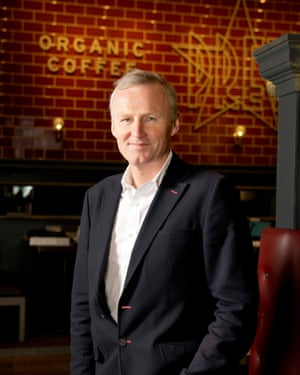Why
New Yorkers are queuing up … for Pret a Manger
While other high-street outlets struggle, the ubiquitous British
chain is doing so well that business is booming even in the spiritual home of
the deli
 Pret
a Manger at Penn Station, New York city. Photograph: Tim Knox for the Observer
Pret
a Manger at Penn Station, New York city. Photograph: Tim Knox for the Observer
Sarah Butler andRupert Neate in New York
Saturday
23 April 201610.59 EDTLast modified on Saturday 23 April
Just after 8am, in the
bowels of Manhattan’s concrete rabbit warren Penn Station, there are a lot of
queues. Long lines of travellers wait for the Long Island Rail Road and Amtrak
trains; for the bathrooms where dozens of homeless people spend the night; and
for food and drinks outside Dunkin’ Donuts, Starbucks and Pret a Manger.
The line for the French-sounding-but-British-owned Pret is
longer than that for any of the other food chains. That’s no surprise as the
outlet, above platforms 20 and 21 on the LIRR, is the busiest for its size of
all the 400 or so Prets worldwide.
The chain – founded with one outlet in London’s Victoria by
serial food entrepreneur Julian Metcalfe and his friend Sinclair Beecham 30
years ago – now operates around the world including China and France. And it is
growing fast: last week Pret revealed sales climbed nearly 14% last year, to
£676m. The improvement is not just the result of opening more outlets: takings
at branches open more than a year were up 7.5%. Profits rose 14.5% to more than
£84m.
Pret’s customers are trendy, health-conscious types. The company
says sales of vegetarian options are up “in double digits” and it is trialling
a veggie-only pop-up shop in the summer. Takings from lines containing avocado
were up 26% last year: Pret’s outlets got through 5 million avocados in 12
months.
The first steps into the US – back in 2001, with a store on New
York’s Broad Street – were faltering. Americans thought the sandwiches had too
much mayonnaise and they took time to be convinced that food sold in packages,
rather than made to order in a deli, could be truly fresh.
But the US is now Pret’s most significant market outside the UK
– with 65 stores and 10 more planned this year. One of those will be a second
outlet in busy Penn Station.
Clive Schlee, chief executive, says: “We have become a bit of a
beacon there.” He says Pret’s strategy in the US has been the same as in the
UK: constant, steady innovation to get the mix right before expansion. It took
five years of tinkering in the UK before Pret opened its second store.

Clive
Schlee, chief executive of Pret a Manger Photograph: Linda Nylind for the
Guardian
Other businesses that have expanded abroad and have been forced
into “hideous retreats” have made the mistake of trying to copy the same
large-scale operations they have in the UK. “At Pret, we can just do a
small-scale kitchen within our own shop. It takes longer but it’s more
durable,” says Schlee, who joined Pret during its uncertain overseas expansion
phase in the early 2000s. At that time McDonald’s was a 33% shareholder,
although it later sold its stake.
In the US, Pret has now adapted to sell a more seasonal menu,
including iced teas and coffees suitable for hot summers and a broader range of
hot foods for cold days. Customers can also choose from six salad dressing
options – compared with the one included in the box in the UK. Meanwhile,
filter coffee – which punters serve themselves – makes up more than 80% of
coffee sales, whereas in Europe more than 80% prefer espresso-based drinks.
Schlee says: “It took time to teach [Americans] that our food
was fresher than they could make themselves from the deli, where the
ingredients might have been sitting around.”
Now he believes New York is a “wonderful Pret market” and the
company could easily have as many stores there as it has in London.
Pret is now majority owned by private equity firm Bridgepoint,
with Metcalfe and the management holding small stakes. Bridgepoint, whose other
investments include businesses like Fat Face, Hobbycraft and Leeds Bradford
Airport, has been involved for eight years, but so far shows no sign of
checking out and there are no current plans to float the business.
“Someone once asked Julian Metcalfe what adjective he would use
to describe Pret and he said dependable. At the time people thought that was
not very glamorous but actually that’s what you want – dependable friends,
dependable meals,” says Schlee.
It’s also about reassuring ethical policies, he says, such as
donating waste food to the homeless through direct relationships with hostels
and offering jobs to more than 200 homeless people.
But Schlee argues that Pret’s key strategy of making food fresh in
kitchens behind each coffee shop – even those in busy and expensive locations
such as Waterloo station – is the key strength of the business. Supermarkets
and the vast majority of other sandwich chains make their food in factories and
deliver them to stores.
Pret’s system offers better flexibility to adapt to new food
trends – such as veggie food and
avocados – and sudden fluctuations in demand caused by the
weather or disruption at transport hubs that can mean surges or slumps in
customer numbers.

Pret
a Manger at Penn Station: customers can serve themselves filter coffee, and
have a choice of salad dressings. Photograph: Tim Knox for the Observer
The chain introduces new food options every three or four months
and is currently testing out evening meals in London. As the government
prepares its sugar tax, Pret is looking at lowering the natural sugar content
of its fruit juices and has 15 staff looking at the next food trends.
In the UK, Schlee is counting on the freshness and flexibility
of Pret’s food to fend off rising competition on the high street. “When you
invite your mother-in-law for lunch on Saturday, you don’t give her food you’ve
made two or three days before – you make something that morning. And that’s
what gives us a massive competitive edge,” he says.
That edge will be important, as up to a fifth of stores selling
clothing, books and other physical products are moving out of the high street.
The gaps are being filled by an ever-increasing array of eateries ramping up
competition with the likes of Pret.
Schlee says: “Pret tends not to worry about the competition but
about being true to itself, avoiding the temptation of centrally made food and
making sure we look after our staff.”
The focus on healthy fare has helped Pret open its first outlet
in a British hospital – a new area for expansion – and there are plans to move
onto university campuses as well as open more outlets in regional British
cities such as Manchester.
Friendly staff – with the freedom to hand out free coffees to
whoever they like up to a certain percentage of sales – are a big part of
building loyalty in those new stores.
The
management is extremely lucky to be selling healthy food at convenience and speed,
which is what people want.
Clive Schlee
Pret doesn’t use zero-hours contracts and has raised wages to
maintain the business’s differential above the new minimum wage for over-25s –
the so-called “national living wage” introduced by the government this month.
Staff earn £7.50 an hour and can earn a £1-an-hour bonus if they
meet customer service criteria checked by mystery shoppers every week. Workers
who put in a full day’s shift also get two free meals and paid breaks.
Schlee says the package will help Pret remain the “employer of
choice” among coffee chains, helping it stand out from rivals such as Caffè Nero and
Eat, both of which have recently been criticised for cutting
back on staff benefits. There are also bonuses, staff discounts,
Friday night parties and paid breaks, which are an important part of its
culture. “That’s a very meaningful part of what we pay,” Schlee says.
The deal for workers, he says, means Pret has lower staff
turnover than the majority of its rivals – less than half its staff leave every
year. Certainly he is a stayer, having spent 13 years running Pret. Why is he
still here?
“My wife says anyone can run Pret. The management is extremely
lucky to be selling healthy food at convenience and speed, which is what people
want. We have had favourable winds,” he says.
No comments:
Post a Comment